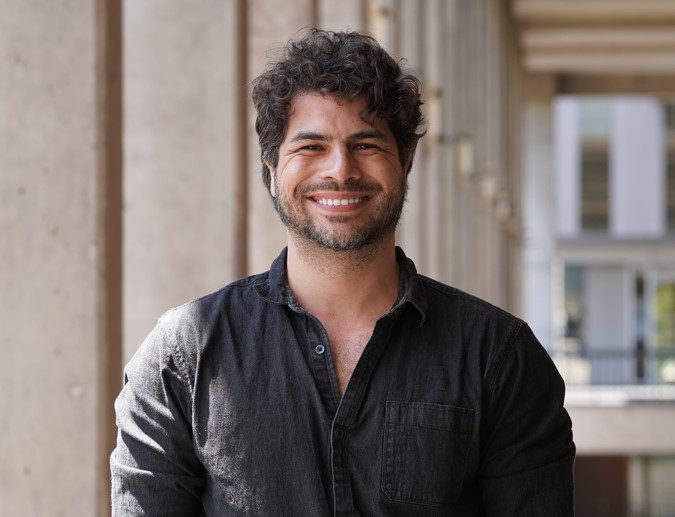+56 22354 7818
| |Doctor en Relaciones Internacionales (2017) por título conjunto entre King’s College London, Reino Unido, y la Universidade de São Paulo, Brasil. Master en Ciencias en Relaciones Internacionales por la Universidade de São Paulo. Francisco Urdinez obtuvo su pregrado en Relaciones Internacionales la Universidad Católica de Córdoba, Argentina.
Su principal área de interés es la economía política internacional, en particular relacionados al ascenso económico de China. También tiene interés en el uso de métodos cuantitativos en las Relaciones Internacionales.
Actualmente, Francisco se encuentra estudiando procesos de difusión coercitiva en los que China condiciona a sus socios comerciales y el uso de diplomacia económica por parte de China. Una agenda secundaria de Francisco se concentra en las relaciones Sur-Sur entre China y Brasil.
Es editor de la Revista de Ciencia Política.
Cursos que imparte
-
ICP0327 Introducción a la Economía Política Internacional (pregrado)
-
ICP5425 Relaciones Internacionales entre China y América Latina (magíster)
-
ICP 5929-1 Métodos Cuantitativos II (doctorado)
Publicaciones
Artículos académicos
keyboard_arrow_down-
Giraudy, A., Urdinez, F., & Freites, A. (2024). Digging deeper: Unpacking the subnational political drivers of chinese extractive investment in Latin America. The Extractive Industries and Society, 20, 101555.
-
Urdinez, F. (2024). Undermining US reputation: Chinese vaccines and aid and the alternative provision of public goods during COVID-19. The Review of International Organizations, 19(2), 243-268.
-
Urdinez, F. (2023). “They own our country!” voter reaction to anti-China rhetoric: The case of the presidential election in Brazil in 2018. Electoral Studies, 86, 102708
-
Pauselli, G., Urdínez, F., & Merke, F. (2023). Shaping the liberal international order from the inside: A natural experiment on China’s influence in the UN human rights council. Research & Politics, 10(3), 20531680231193513
-
(2022) with Diego Telias. China’s Foreign Aid Political Drivers: Lessons from a Novel Dataset of Mask Diplomacy in Latin America during the COVID-19 Pandemic. Journal of Current Chinese Affairs. DOI: 10.1177/18681026211020763
-
(2022) with Juan Carlos Gachúz Maya. Geopolitics and Geoeconomics in the China–Latin American Relations in the Context of the US–China Trade War and the COVID-19 Pandemic. Journal of Current Chinese Affairs. DOI: 10.1177/18681026221098770
-
(2021) with Giovanni Agostinis. The Nexus between Authoritarian and Environmental Regionalism: An Analysis of China’s Driving Role in the Shanghai Cooperation Organization. Journal Problems of Post-Communism.
-
(2021) Urdinez, Francisco & Long, Tom. 2021. Status at the Margins: Why Paraguay Recognizes Taiwan and Shuns China. Foreign Policy Analysis. Volume 17, Issue 1
-
(2020) with Daniela Campello Voter and Legislator Responses to Localized Trade Shocks from China in Brazil. Comparative Political Studies.
-
(2020) The accession of Latin American countries to the Asian Infrastructure Investment Bank: lessons from Brazil and Chile. Asian Education and Development Studies.
-
(2020) with Tom Long Status at the Margins: Why Paraguay Recognizes Taiwan and Shuns China. Foreign Policy Analysis.
-
(2020) with Juan Enrique Serrano Moreno, Diego Telias Deconstructing the Belt and Road Initiative in Latin America. Asian Education and Development Studies.
-
(2019) with Jan Knoerich. "Contesting Contested Multilateralism: Why the West Joined the Rest in Founding the Asian Infrastructure Investment Bank". The Chinese Journal of International Politics. doi.org/10.1093/cjip/poz007
-
(2019) with Pietro Rodrigues and Amancio de Oliveira. "Measuring International Engagement: Systemic and Domestic Factors in Brazilian Foreign Policy from 1998 to 2014". Foreign Policy Analysis. 1-22. ISI.
-
(2018). with Jing-Lin Duanmu. “The dissuasive effect of U.S. political influence on Chinese FDI during the ‘Going Global’ policy era”. Business & Politics, 20, 38-69. SCOPUS.
-
(2018). with Jan Knoerich and Pedro Feliu Ribeiro. “Don’t Cry for me ‘Argenchina’: Unraveling Political Views of China through Legislative Debates in Argentina”. Journal of Chinese Political Science, 23(2), 235-256. SCOPUS.
-
(2017) with Nicole Jenne and Luis Schenoni. "Of words and deeds: Latin American declaratory regionalism, 1994-2014". Cambridge Review of International Affairs, 30(2), 195-215. ISI.
-
(2017) with Pedro Feliú Ribeiro. “Are there two presidents in Argentina? A comparative analysis of legislative support for foreign and domestic policy (2001-2014)”. Revista de Ciencia Política, 37(1), 95-119. ISI.
-
(2016). with Fernando Mouron, Luis Schenoni and Amâncio de Oliviera. “Chinese economic statecraft and US hegemony in Latin America: an empirical analysis, 2003–2014”. Latin American Politics and Society, 58(4), 3-30. ISI.
-
(2016) with Fernando Mouron and Luis Schenoni. “Sin espacio para todos: China y la competencia por el Sur”. Revista CIDOB d'afers internacionals, (114), 17-39. SCOPUS.
-
(2016) with Camilo Lorez Burián and Amâncio de Oliveira. “MERCOSUR and the Brazilian Leadership Challenge in the Era of Chinese Growth: A Uruguayan Foreign Policy Perspective”. New Global Studies, 10(1), 1-25. ProQuest.
-
(2016) with Fernando Mourón and Janina Onuki. “Framing effects on foreign policy: experimental evidence from emerging countries and the Argentine-Brazilian rivalry”. Opinião Pública, 22(1), 195-218. SCOPUS.
-
(2015) with Gilmar Masiero. “China and the WTO: Will the Market Economy Status make any difference after 2016?”. Chinese Economy, 48(2), 155-172. SCOPUS.
Libro
keyboard_arrow_down-
Urdinez, F. & Cruz, A. (2020). R for Political Data Science: A Practical Guide. CRC Press.
Prensa
keyboard_arrow_down-
Cómo Paraguay quedó atrapado en la histórica pelea entre Taiwán y China (y qué tiene que ver el coronavirus). BBC News Mundo, 2021
-
China y sus desafíos. CNN Chile. 2021
-
China-Latin America 2.0. Taiwan’s Last Stand in South America. Americas Quarterly. 2020
-
Argentina’s Financial Crisis Creates an Opportunity for China. Bloomberg Businessweek. May 21, 2019
-
Trade war could chill China’s growing investment in US economy. The Conversation. July 16, 2018
-
Las relaciones triangulares: Sobre cómo la hegemonía de Estados Unidos ha condicionado la asertividad china en América Latina, Red CAEM, Noviembre, 2017.
-
¿Para qué bando juega China en la crisis norcoreana?. Foreign Affairs Latinoamérica. 22 mayo, 2017
-
Pensar una Política Comercial Competitiva desde el Pacífico. Fundación Centro de Estudios Internacionales Contemporáneos. 31 agosto, 2017.
